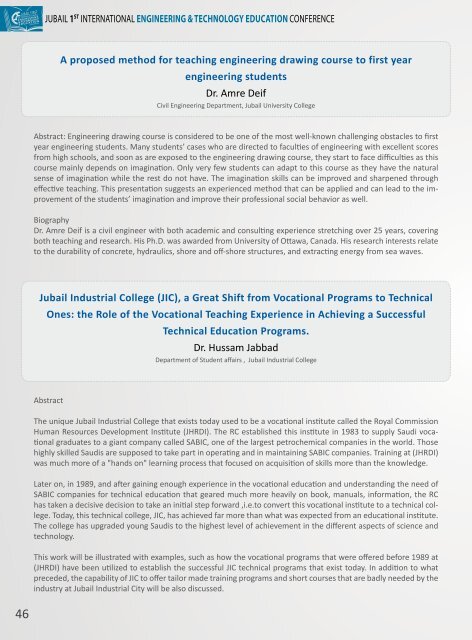exhIbITOR - Gulf Forums and Exhibitions Est.
exhIbITOR - Gulf Forums and Exhibitions Est.
exhIbITOR - Gulf Forums and Exhibitions Est.
Create successful ePaper yourself
Turn your PDF publications into a flip-book with our unique Google optimized e-Paper software.
46<br />
A proposed method for teaching engineering drawing course to first year<br />
engineering students<br />
Dr. Amre Deif<br />
Civil Engineering Department, Jubail University College<br />
Abstract: Engineering drawing course is considered to be one of the most well-known challenging obstacles to first<br />
year engineering students. Many students’ cases who are directed to faculties of engineering with excellent scores<br />
from high schools, <strong>and</strong> soon as are exposed to the engineering drawing course, they start to face difficulties as this<br />
course mainly depends on imagination. Only very few students can adapt to this course as they have the natural<br />
sense of imagination while the rest do not have. The imagination skills can be improved <strong>and</strong> sharpened through<br />
effective teaching. This presentation suggests an experienced method that can be applied <strong>and</strong> can lead to the improvement<br />
of the students’ imagination <strong>and</strong> improve their professional social behavior as well.<br />
Biography<br />
Dr. Amre Deif is a civil engineer with both academic <strong>and</strong> consulting experience stretching over 25 years, covering<br />
both teaching <strong>and</strong> research. His Ph.D. was awarded from University of Ottawa, Canada. His research interests relate<br />
to the durability of concrete, hydraulics, shore <strong>and</strong> off-shore structures, <strong>and</strong> extracting energy from sea waves.<br />
Jubail Industrial College (JIC), a Great Shift from Vocational Programs to Technical<br />
Ones: the Role of the Vocational Teaching Experience in Achieving a Successful<br />
Technical Education Programs.<br />
Dr. Hussam Jabbad<br />
Department of Student affairs , Jubail Industrial College<br />
Abstract<br />
The unique Jubail Industrial College that exists today used to be a vocational institute called the Royal Commission<br />
Human Resources Development Institute (JHRDI). The RC established this institute in 1983 to supply Saudi vocational<br />
graduates to a giant company called SABIC, one of the largest petrochemical companies in the world. Those<br />
highly skilled Saudis are supposed to take part in operating <strong>and</strong> in maintaining SABIC companies. Training at (JHRDI)<br />
was much more of a "h<strong>and</strong>s on" learning process that focused on acquisition of skills more than the knowledge.<br />
Later on, in 1989, <strong>and</strong> after gaining enough experience in the vocational education <strong>and</strong> underst<strong>and</strong>ing the need of<br />
SABIC companies for technical education that geared much more heavily on book, manuals, information, the RC<br />
has taken a decisive decision to take an initial step forward ,i.e.to convert this vocational institute to a technical college.<br />
Today, this technical college, JIC, has achieved far more than what was expected from an educational institute.<br />
The college has upgraded young Saudis to the highest level of achievement in the different aspects of science <strong>and</strong><br />
technology.<br />
This work will be illustrated with examples, such as how the vocational programs that were offered before 1989 at<br />
(JHRDI) have been utilized to establish the successful JIC technical programs that exist today. In addition to what<br />
preceded, the capability of JIC to offer tailor made training programs <strong>and</strong> short courses that are badly needed by the<br />
industry at Jubail Industrial City will be also discussed.


